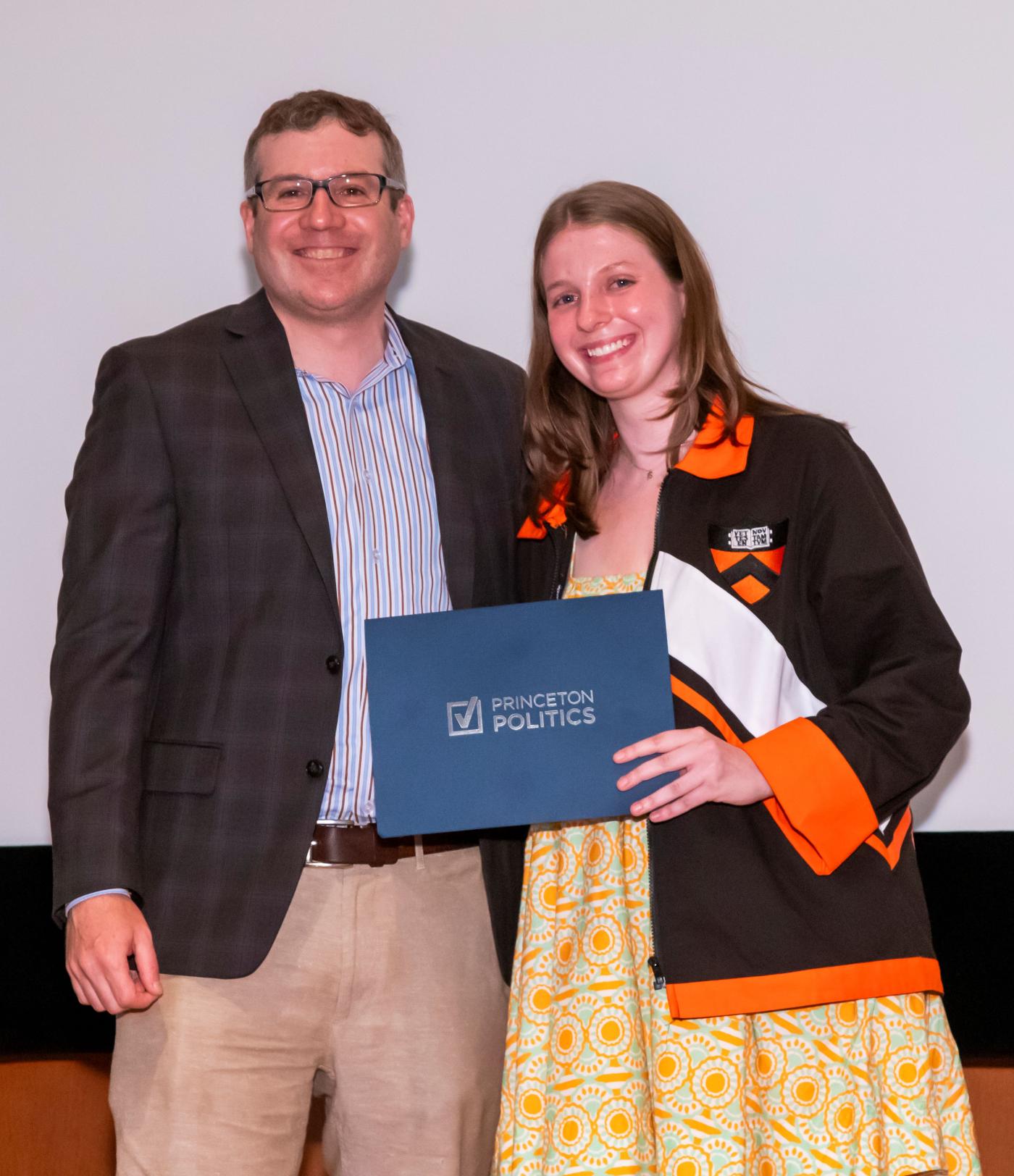

The Junior Independent Work (JIW) requirement in Politics provides majors with an opportunity to delve into their research interests and conduct a thorough examination. The goal is for students to produce a well-reasoned and analytical essay that scrutinizes a political issue using approaches from political science. Over the course of two semesters, students are required to undertake two research projects, consisting of a Research Prospectus in the fall and a Junior Paper in the spring. The Department views these as “building blocks” toward the preparation of a strong senior thesis.
Fall Junior Independent Work
All Politics juniors are required to take POL 300 (Conducting Independent Research in Political Science) for departmental course credit, and will be assigned to a Junior Practicum in which they will both learn more about a specific topic and write a Research Prospectus.
[Important Note: Students must block out the time that POL 300 is offered in order to complete this requirement and should take into account their practicum selections when choosing the subsequent Fall semester courses.]
A Junior Research Prospectus is the culmination of the Fall JIW requirement for juniors in the Department of Politics. The Prospectus is normally 12-15 pages, and will include a description of the significance of the topic with references to the relevant literature and a detailed research design. The Prospectus is supposed to define a significant political question or problem and to outline a design for answering it through ha process of systematic researching which may, depending on the nature of the topic selected, involve detailing the relevant primary and secondary literature or original documents, interviews, or compilation and analysis of existing or newly to be collected statistical data. The range of subjects suitable for a prospectus is very wide. Most projects involve the following elements: defining a significant question, formulating a hypothesis, detailing the relevant evidence and outlining how it would be assessed, reviewing critically the work of others on this subject, evaluating alternative methods of inquiry, showing critical awareness of the limits of one’s projected arguments, and prospectively relating one’s inquiry to a larger political context of issues. The Prospectus is not a passive review of the existing literature, nor a summary of facts, nor a long editorial. It sets out the framework for conduct of a critical and creative analysis of a question, problem or issue. A framework that would allow for the development of a student’s own well-reasoned views, should the Prospectus be carried out, is an essential part of this exercise. Policy recommendations are welcome but not required.
Spring Junior Independent Work
In the spring semester, juniors complete a Junior Paper under the supervision of an independent work adviser. A Junior Paper written in the Department of Politics is normally an essay of 20 to 35 double-spaced pages that is clearly focused on one--or a few related--political questions, problems or issues. Junior papers are supposed to define a significant political question or problem and to answer it through a process of systematic research which may, depending on the nature of the topic selected, involve reading primary and secondary literature or original documents, interviewing, or compiling and analyzing statistical data. The range of subjects suitable for such essays is very wide. Most projects involve the following elements: defining a significant question, formulating a hypothesis, gathering and assessing evidence, reviewing critically the work of others on this subject, evaluating alternative methods of inquiry, critically reviewing one's own arguments, and relating one's findings and conclusions to a larger political context of issues. The Junior Paper is not a passive review of the existing literature, nor a summary of facts, nor a long editorial. It presents a critical and creative analysis of a question, problem or issue. A presentation of the student's own well-reasoned views is an essential part of this exercise. Policy recommendations are welcome but not required.
In general, the standards for senior theses apply in faculty evaluations of the Junior Paper, with the understanding that the time available to work on a Junior Paper is much less than the time available for the senior thesis. Faculty advisers are expected to submit extensive comments on the written work of the students whom they advise.
The Junior Paper should be advised by a Politics faculty member. In rare circumstances, a Junior Paper may be supervised by a faculty member outside the Department of Politics with special permission from the Director of Undergraduate Studies. (The Director of Undergraduate Studies may require a paper supervised outside of the Department to be second read by a Politics faculty member. If there is a difference in the assigned grades, the two grades will be reconciled according to the procedures for grading senior theses.)
While the Fall JIW will culminate in the writing of a prospectus for a Junior Paper, students are under no obligation to write their Junior Paper in the spring on the same topic, or with the same faculty member who advised their Fall JIW. Students may ask the faculty member who advised their Fall JIW to advise their Junior Paper in the spring, but the faculty member is under no obligation to do so (and no faculty member is likely in any case to be able to advise the Junior Papers of all the students who have taken their JIW).
Students are encouraged to direct their Junior Paper toward a possible thesis topic, and are allowed to use some of the same research for both. Nonetheless, the Junior Paper must be an independent piece of work which stands on its own, and it may not be incorporated directly into the thesis. The Spring JP may expand upon ideas that you explored in the Research Prospectus. A student may draw on and cite your own prospectus just like they would use other resources. In addition, you may re-use a limited portion of your prospectus in the Spring JP, including the literature review. Whenever material from the prospectus is re-used, the student must add a footnote noting the duplication. Note this policy does not affect the standard University guidelines for attributing ideas and research findings, whenever appropriate.
NOTE: Special permission is required to submit the same paper both for purposes of Junior Independent Work and for a course. The Director of Undergraduate Studies and all instructors involved must give their consent in writing. This option is strongly disfavored, and permission will be given only in extremely exceptional circumstances. In cases where the course instructor is also the student’s junior adviser, it may be required that the paper be second-read by another faculty member of the Department.
- Junior Practicums
- Writing a JP: The Handbook (from the Writing Program)
- Submission and Grading of Independent Work

Students are strongly urged to submit rough drafts of their junior papers to their independent work advisers. Comments received on a first draft may be crucial to the project's success. Advisers are under no obligation to give detailed comments on preliminary versions of a Research Prospectus or Junior Paper if they are submitted after these departmental deadlines. Advisers may choose to read drafts after these deadlines, and faculty are encouraged to set their own preferred deadlines for preliminary work.
The rough draft deadlines set by the Department are:
-for the Fall Research Prospectus, the last day of Reading Period
-for the Spring Junior Paper, is the Friday after Spring Break
The completed final assignments (Research Prospectus in Fall semester, Junior Paper in Spring semester) must be submitted into the Department of Politics junior independent work database by 4:00 pm on the day of the University’s stated deadlines for independent work as noted in our important dates. The Research Prospectus and Spring JP may not be submitted after the Politics deadline without the prior approval from the student’s Residential College Dean. If the student’s Residential College Dean, in conjunction with the Director of Undergraduate Studies, approves an extension with a late penalty, a late penalty of 1/3 of a letter grade for every 48 hours will be applied, beginning at 4:00 pm on the due date.
Students will receive one POL 981 grade at the end of spring term that is a weighted average of fall (30%) and spring (70%) JIW grades. POL 981 will carry 2.0 units. Students must achieve a grade of C or better in POL 981. If a student receives a grade below C in POL 981, another Junior Paper is required with a grade that brings the average of this additional paper and the POL 981 grade to at least a grade of C. This is a prerequisite for beginning the senior year. For purposes of this requirement, the grades before application of any penalties are used.

